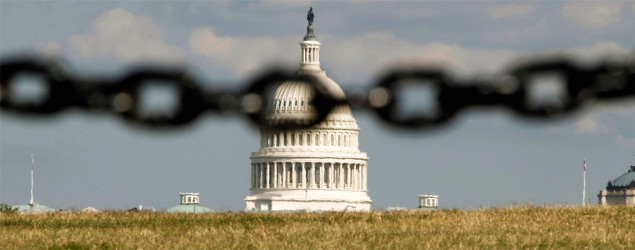WASHINGTON (AP) -- The political stare-down on Capitol Hill shows no signs of easing, leaving federal government functions — from informational websites, to national parks, to processing veterans' claims — in limbo from coast to coast. Lawmakers in both parties ominously suggested the partial shutdown might last for weeks.
A funding cutoff for much of the government began Tuesday as a Republican effort to kill or delay the nation's health care law stalled action on a short-term, traditionally routine spending bill. Republicans pivoted to a strategy to try to reopen the government piecemeal but were unable to immediately advance the idea in the House.
National parks like Yellowstone and Alcatraz Island were shuttered, government websites went dark and hundreds of thousands of nonessential workers reported for a half-day to fill out time cards, hand in their government cellphones and laptops, and change voicemail messages to gird for a deepening shutdown.
The Defense Department said it wasn't clear that service academies would be able to participate in sports, putting Saturday's Army vs. Boston College and Air Force vs. Navy football games on hold, with a decision to be made Thursday.
Even as many government agencies closed their doors, health insurance exchanges that are at the core of President Barack Obama's health care law were up and running, taking applications for coverage that would start Jan. 1.
"Shutting down our government doesn't accomplish their stated goal," Obama said of his Republican opponents at a Rose Garden event hailing implementation of the law. "The Affordable Care Act is a law that passed the House; it passed the Senate. The Supreme Court ruled it constitutional. It was a central issue in last year's election. It is settled, and it is here to stay. And because of its funding sources, it's not impacted by a government shutdown."
GOP leaders faulted the Senate for killing a House request to open official negotiations on the temporary spending bill. Senate Democrats led by Majority Leader Harry Reid of Nevada insist that Republicans give in and pass their simple, straightforward temporary funding bill, known as a continuing resolution.
"None of us want to be in a shutdown. And we're here to say to the Senate Democrats, 'Come and talk to us,'" House Majority Leader Eric Cantor, R-Va., said as GOP lawmakers designated to negotiate the shutdown legislation met among themselves before cameras and reporters. "At each and every turn, the Senate Democrats refused to even discuss these proposals."
Late Tuesday, House Republicans sought passage of legislation aimed at reopening small slices of the government. The bills covered the national parks, the Veterans Affairs Department and city services in Washington, D.C., such as garbage collection funded with local tax revenues.
The move presented Democrats with politically challenging votes but they rejected the idea, saying it was unfair to pick winners and losers as federal employees worked without a guarantee of getting paid and the effects of the partial shutdown rippled through the country and the economy. The White House promised a veto.
Since the measures were brought before the House under expedited procedures requiring a two-thirds vote to pass, House Democrats scuttled them, despite an impassioned plea by Democratic D.C. Delegate Eleanor Holmes Norton, who recalled that in the last shutdown 17 years ago she prevailed on House Speaker Newt Gingrich to win an exemption to keep the D.C. government running.
"I must support this piecemeal approach," Norton said. "What would you do if your local budget was here?"
But other Democrats said Republicans shouldn't be permitted to choose which agencies should open and which remain shut.
"This piecemeal approach will only prolong a shutdown," Rep. Tammy Duckworth, D-Ill., said.
Republicans said there could be more votes Wednesday, perhaps to allow the National Institutes of Health to continue pediatric cancer research. The NIH's famed hospital of last resort wasn't admitting new patients because of the shutdown. Dr. Francis Collins, agency director, estimated that each week the shutdown lasts would force the facility to turn away about 200 patients, 30 of them children, who want to enroll in studies of experimental treatments. Patients already at the hospital are permitted to stay.
Republicans also said the House may vote anew on the three measures that failed Tuesday, this time under normal rules requiring a simple majority to pass.
Republicans hoped such votes would create pressure on Democrats to drop their insistence that they won't negotiate on the spending bill or an even more important subsequent measure, required in a couple of weeks or so, to increase the government's borrowing limit.
There were suggestions from leaders in both parties that the shutdown could last for weeks and grow to encompass the measure to increase the debt limit. "This is now all together," Sen. Dick Durbin, D-Ill., said.
"It's untenable not to negotiate," House Budget Committee Chairman Paul Ryan, R-Wis., said. "I've always believed it was the debt limit that would be the forcing action."
While GOP leaders seemed determined to press on, some Republicans conceded they might bear the brunt of any public anger over the shutdown — and seemed resigned to an eventual surrender in their latest bruising struggle with Obama.
Democrats have "all the leverage and we've got none," Sen. Saxby Chambliss of Georgia said.
Rep. Scott Rigell of Virginia said it was time to pass legislation reopening the government without any health care impediments.
"The shutdown is hurting my district — including the military and the hardworking men and women who have been furloughed due to the defense sequester," he said.
But that was far from the majority view among House Republicans, where tea party-aligned lawmakers prevailed more than a week ago on a reluctant leadership to link federal funding legislation to the health care law. In fact, some conservatives fretted the GOP had already given in too much.
No end in sight for government shutdown

The political stare-down on Capitol Hill shows no signs of easing, with both sides suggesting a resolution could take weeks.
Next moves